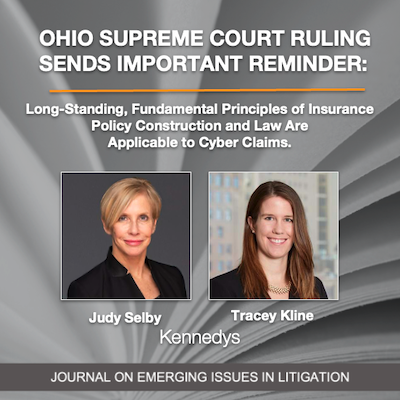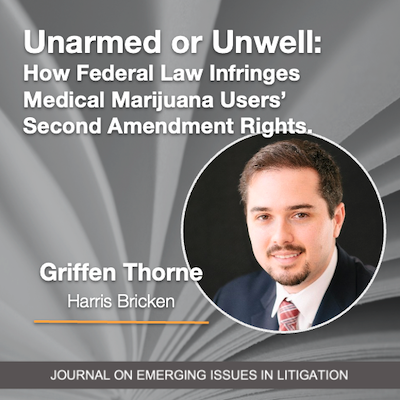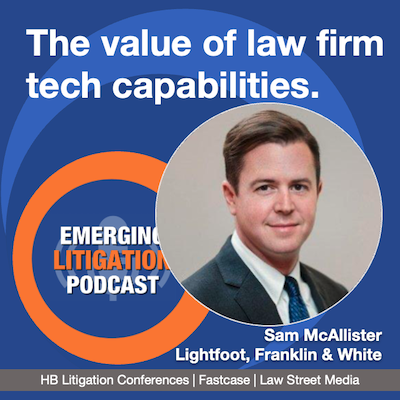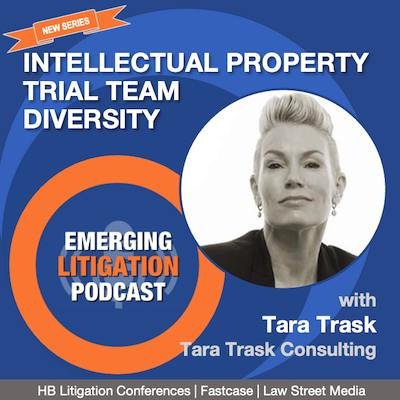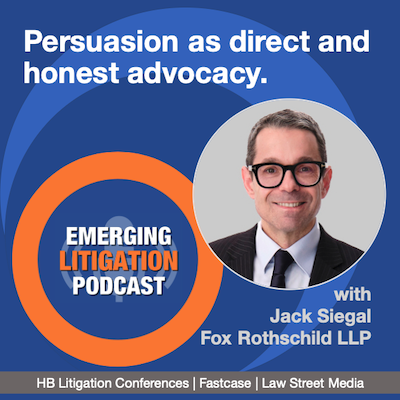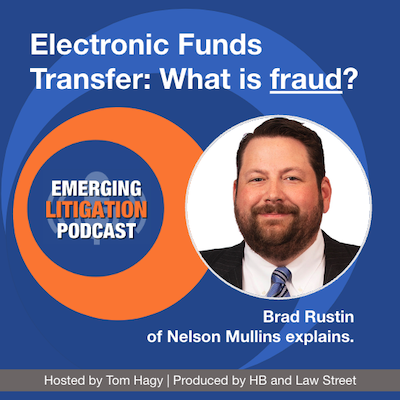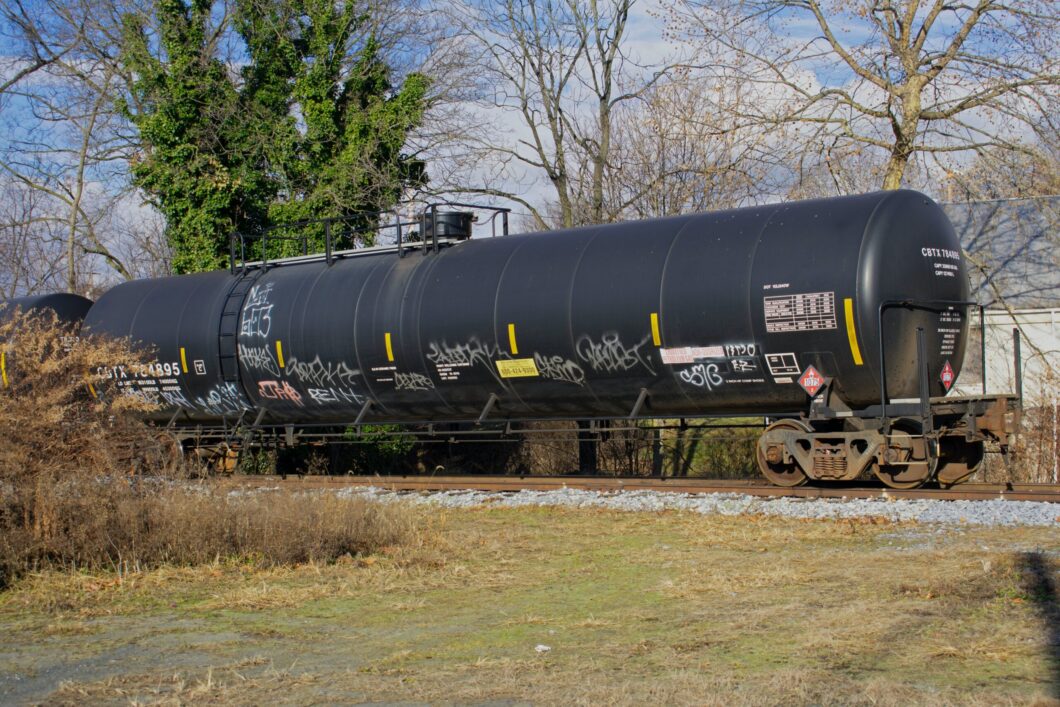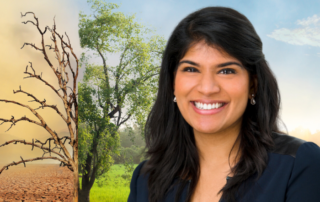Emerging Litigation Podcast
Biometric Privacy Litigation and Coverage Disputes with John Leonard and Cort Malone
Biometric data is big business. In many cases it even helps make our lives better. It also presents significant risks for a variety of parties, in addition to those of us who surrender our data. Companies collecting, storing, utilizing, and monetizing the data face penalties and litigation bolstered by the increasing number of states enacting biometric information privacy acts, or BIPAs, the first of which was in Illinois. In this episode, we discuss the state of biometric privacy litigation, the regulatory landscape, insurance coverage considerations, and recent rulings with guests John Leonard and Cort Malone of Anderson Kill P.C.
Mitigating Greenwashing Litigation Risks with Ramya Ravishankar
In this episode, we discuss mitigating greenwashing litigation risks with guest Ramya Ravishankar, General Counsel at HowGood, an independent research firm that helps the world’s largest food brands meet their sustainability commitments. Listen and learn more!
Automation Comes to Our Litigation Nation with James Lee
In this episode, we discuss litigation automation and another case in which innovators are using artificial intelligence to transform legal operations with guest James M. Lee, co-founder and CEO of LegalMation. Listen and learn more!
A Shameless Plug for Our Content Services
Your content marketing is everything you’ve ever dreamed of. Right?

Critical Legal Content was founded by Tom Hagy, former Editor & Publisher of Mealey’s Litigation Reports and VP at LexisNexis, founder of HB, current litigation podcaster and editor-in-chief. CLC’s mission is to help smaller firms and service providers not only create content — blogs, articles, papers, webinars, podcasts (like the stuff on this site) — but also to get it out there. How? Via social media, this website, your website, and potential via our podcast and journal which we publish in collaboration with vLex Fastcase and Law Street Media. The goal is to attract readers and dizzy them with your brilliance.
*Inspired by actual events.
Create content like a real legal publisher.
Emerging Litigation Journal
AI tool that summarizes evidence from cracked phones wades into uncharted constitutional waters
As law enforcement agencies adopt cutting-edge AI to process digital evidence, constitutional questions are quickly coming into focus. Guest contributor Justin Ward explores how Cellebrite’s new AI-driven tool—capable of scanning and summarizing entire phone contents—may clash with Fourth Amendment protections. While the tech promises efficiency, civil rights advocates argue it opens the door to warrantless digital dragnets, with court interpretations varying widely across jurisdictions.
Valid Antitrust Concerns or Partisan Objectives: Which Will Guide Trump’s FTC?
Concerned that the spirit of retribution that drove executive orders against some of the nation's largest law firms will carry over to business deals, Tom Hagy writes about recent changes at the Federal Trade Commission and some of the comments from the new chair that suggest infusion of retribution into the process of examining business deals is inevitable.
AI tools may be the cause of the explosion in nuclear verdicts — and also the solution
Guest contributor Justin Ward discusses how artificial intelligence is both fueling and fighting the rise of “nuclear verdicts.” Plaintiff attorneys are using AI to identify high-damages cases, favorable jurisdictions, and winning arguments—driving a spike in verdicts over $10 million. At the same time, defense lawyers and insurers are adopting tools like NaVeL to spot high-risk cases early and craft smarter strategies. As AI reshapes legal practice, the very technology accelerating massive awards may also be the best hope for containing them.
HB Webinars on CeriFi LegalEdge
AI Nuts & Bolts Survival Guide: Artificial Intelligence – Discrimination in Employment Context
On this CLE webinar, Duane Morris LLP Attorneys Alex W. Karasik, Gerald L. Maatman, Jr., and George J. Schaller discuss two novel artificial intelligence lawsuits, recent governmental guidance related to AI use, the business risks associated with AI, and mitigation strategies.
AI Image Generators and Copyright: Eligibility in the U.S., UK, EU, and More; Fair Use, Derivative Works, Liability
AI Image Generators and Copyright: Eligibility in the U.S., UK, EU, and More; Fair Use, Derivative Works, Liability AI programs are now readily available for all. Stability AI, Lensa, and other AI image creation tools create original works of art, raising the question of IP protection for such art. The United States requires human authorship in order to obtain copyright protection, and so far, the U.S. Copyright Office has declined to grant copyright registrations for AI-created works of art based on a lack of human authorship (one of these decisions is being challenged in Thaler v. Perlmutter (D.D.C. filed June 2, 2022)). While some countries take a similar approach to the US, others treat the issue of copyright eligibility for AI-generated art quite differently and provide at least some protection of computer generated works. Questions have also been raised as to whether AI-generated images constitute derivative works and whether such images and the AI generation tools used to create them infringe third-party copyrights, or whether the fair use doctrine or other defenses may apply. The first lawsuits involving image generators have now been filed raising copyright claims in addition to other claims. Listen as our authoritative panel of IP attorneys examines AI image generators and the associated copyright issues. The panel will discuss eligibility in the U.S. and the recent actions by the Copyright Office and contrast this with the approaches used in other countries. The panel will also address the recent cases that have been filed and the potential liability for copyright infringement in the U.S. and other countries. Michael R. Graif Member Mintz Levin Cohn Ferris Glovsky and Popeo Lisa T. Oratz Senior Counsel Perkins Coie Scott J. Sholder Partner Cowan DeBaets Abrahams & Sheppard CLE On-Demand Webinar This Strafford production has been specially selected for HB audiences. What hurdles confront counsel when demonstrating authorship of AI-generated works? How does [...]
Class Certification Evidence: Standards of Admissibility and Probative Value Among the Circuits
Class Certification Evidence What Are the Standards of Admissibility and Probative Value Among the Circuits? Numerous splits exist among the circuits on two key certification issues: What is required to prove the elements for class certification and whether plaintiff's certification evidence must be admissible. Further, courts apply different admissibility standards to fact evidence than to expert evidence. Certain courts have issued clear guidance on these important issues, while others have remained circumspect, sending mixed signals. This is particularly vexing for defendants, who may be sued in more than one district or circuit. What is sufficient for class certification in one jurisdiction may be inadequate in another. With standards unsettled, counsel must anticipate and preserve the right to revisit class certification by preserving all objections and the factual record. Listen as the panel of class action attorneys discusses the standards of admissibility of evidence at certification and best strategies for leveraging ambiguities. Questions Addressed How can defense counsel preserve objections to admissibility? How can counsel leverage the law of other circuits in jurisdictions with no controlling precedent? What does how a court assesses evidence imply about its view on admissibility standards? Webinar Outline Fact evidence Need not be admissible Must be admissible Ambiguous Expert evidence Full Daubert analysis Limited Daubert analysis Strategies for managing and leveraging the uncertainty A Strafford production specially selected for HB audiences. Learn Strategies forOpposing or Narrowing Class Certificationand Preserving Objections This Strafford production has been specially selected for HB audiences. Kevin Daly Counsel Robinson & Cole Alexander Madrid Partner McGuire Woods Michael Ruttinger Partner Tucker Ellis Robert Sparkes, III Partner K&L Gates This Strafford production has been specially selected for HB audiences.

